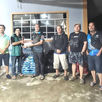Transforming state education system an urgent necessity
- nabalunews
- May 28, 2025
- 2 min read

28 May 2025
KOTA KINABALU: Transforming the state’s education system is an urgent necessity to ensure Sabah’s students are equipped to face the challenges of the future.
Chief Minister Datuk Seri Hajiji Noor has emphasised that the latest research data from 2024 shows that only 65 per cent of students possess good or excellent problem-solving skills, while just 72 per cent feel confident applying scientific knowledge in their daily lives.
“This indicates that we cannot afford to be complacent. Many students are still struggling to grasp fundamental STEM concepts. Therefore, education transformation must become a top priority for all stakeholders,” he said.
He made the remarks while officiating the International Education Research Conference, Astounding Research Innovation STEM Exploration (ARISE) 2025, held at the Sabah International Convention Centre (SICC) today.
According to Hajiji, teaching approaches rooted in research and innovation must be strengthened and mainstreamed to ensure Sabah’s education system remains relevant, inclusive, and competitive.
He urged all educators, educational institutions, researchers, and policymakers to continue exploring and improving pedagogical approaches in line with the digital age and current industry demands.
Hajiji noted that ARISE 2025, which brings together over 600 participants from both Malaysia and abroad, including the United Kingdom, Spain, the Philippines, China, and Ireland, serves as a vital platform for fostering global-level educational collaboration.
“This conference not only unites educators, researchers, and policymakers from various countries, but also promotes the empowerment of science, technology, and culture-based education,” he added.
He also underlined the importance of Technical and Vocational Education and Training (TVET) alongside Science, Technology, Engineering and Mathematics (STEM) education as key drivers in developing a high-quality, competitive, and innovative human capital in Sabah.
In this context, he said the State Government has allocated RM41.75 million this year to the Ministry of Science, Technology and Innovation Sabah (KSTI), the Sabah Skills and Training Centre (SSTC), and the Sabah Creative Economy and Innovation Centre for the implementation of various training and skills development programmes.
“Key programmes include Kembara Sains Borneo, the Sabah Science Carnival, Technology and Innovation Competitions, the STEM Education Festival, the Roboneo Programme, and the Sabah Screen Fest, all of which serve as important platforms to spark student interest in technology and engineering fields.”
Hajiji also welcomed the presentation of 13 subthemes at the conference, covering areas such as digital education, Malay studies, Islamic education, guidance and counselling, sports science, visual arts, and early childhood education.
He expressed confidence that this exchange of knowledge would lead to international collaboration that could elevate the profile of Sabah’s researchers and educational institutions on the global stage.
“Educators are the heart and backbone of successful education transformation.
“I urge them to be bold in exploring research and innovation in education,” he said.
He also affirmed that the conference reflects the State Government’s commitment under the Sabah Maju Jaya Development Plan 2021–2025, which prioritises education as a catalyst for the state’s sustainable development.















Comments